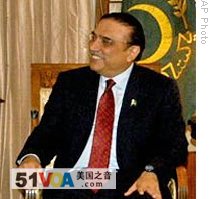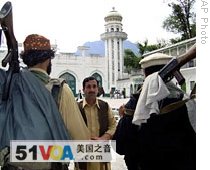Islamabad
14 April 2009
 |
| President Asif Ali Zardari in Islamabad, 13 Apr 2009 |
President Asif Zardari's formal approval of the deal for Islamic law in the Malakand area brought swift praise from regional lawmakers and mediators who signed off on the agreement in February.
Ameer Izzat, a spokesman for hardline cleric and former militant Sufi Muhammad who acts as the mediator between Taliban forces and the government, said the signed deal would soon lead to peace in the troubled Swat valley.
He said with this announcement many fighters have already put down their weapons. He said when the courts begin to fully function, all of the armed men will put down their weapons and start to live a normal life.
U.S. officials and Pakistani human-rights activists have expressed concern about the arrangement since it was first tentatively implemented. They say it allows the Taliban's growing influence in the northwest, further erodes government authority, and undermines basic rights for people living in the region.
Army analyst and retired general Talat Masood said after the government failed to militarily defeat the Swat Taliban during the past year, the militants effectively forced officials into accepting a deal on their terms.
"They really had the upper hand. They dictated the entire terms of the agreement, so it is a complete capitulation on the part of the government and the establishment of Pakistan," he said.
Masood said the people of Swat have welcomed the deal largely because they believe it is one of their last hopes for peace in the region.
Parliament lawmakers unanimously approved a resolution backing the measure on Monday, despite some members' earlier criticism of the measure.
 |
| Taliban activists are seen near a mosque in Buner, which was closed after the Taliban took it over on 11 Apr 2009 |
Information Minister Qamar Zaman Kaira told reporters in Islamabad that with the Malakand peace agreement signed, officials hope militants in Buner will stop fighting. He also defended the peace deal as a component of a larger ideological standoff with the Taliban.
"We hope the situation in Buner will improve in the days to come. The struggle is much broader, because the government is fighting the mindset of the militants. Tthat mindset is prevalent in every village in Pakistan," he said.
For now, officials are waiting to see if Taliban fighters follow through on pledges to lay down their weapons. Minister Kaira said if they do not, the government will take action.
Swat mediator Sufi Muhammad told a private Pakistani TV channel that he expected militants will honor their pledges. As for Buner, he claimed the militants there are in fact locals and once Islamic law is implemented, they will put down their weapons and return to their homes.